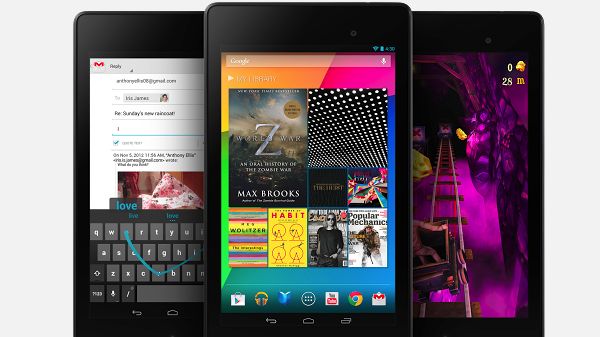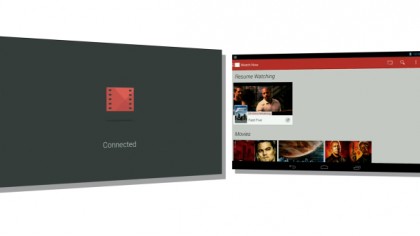Google shows off new Nexus 7 while PM ponders porn plug
New Nexus, TV Chrome and filters for filth

We like new toys at TechRadar, and this week Google gave us lots to play with. There's a new tablet (the Nexus 7 2), a digital TV dongle and a spanking new version of Android.
The Nexus 7 was a game changer. After Amazon's Kindle Fire showed us that tablets could be cheap, the Nexus showed us that cheap needn't mean nasty. The second incarnation of the Nexus is slightly more expensive - $229 versus the original's $199 - but you get a lot more for your money too.
As Jon Mundy reports, "The highly anticipated reboot features full HD resolution - 1920 x 1200 - making this the highest resolution 7-inch tablet... What's more, the New Nexus 7 2 now has stereo speakers and Fraunhofer's surround sound system, as well as an HDMI output for connecting to a big screen TV."
In addition there's a faster processor offering nearly double the processing power of the original, while the on-board memory has been doubled to 2GB. As before there's a choice of 16GB and 32GB models.
Nexus specs
So how does it compare to its rivals, the iPad Mini and the Kindle Fire HD 7-inch? Mundy's riffled through the spec sheets to find out.
The Kindle Fire wins on price, but the Nexus wins on performance - and it makes the iPad mini look a little old-fashioned, not least because of the Nexus's HD screen.
The Nexus also comes with the latest version of Jelly Bean, Android 4.3. Is it the kind of update we'll be telling our grandchildren about in years to come? Er, no, but it does have some cool new features.
Get daily insight, inspiration and deals in your inbox
Sign up for breaking news, reviews, opinion, top tech deals, and more.
Multi-user support is vastly improved, parental controls are much better, there's support for Bluetooth Smart devices and the graphics engine has been given a major boost too.
Controversially there are also new DRM APIs, which enable media firms such as Netflix to stream content without that content being nicked.
Tune in to Chromecast
Netflix appears on another new Google product, the $35 Chromecast: every customer gets three months of Netflix thrown in for free, which almost covers the cost of the device.
It's a clever little thing, plugging into your TV's HDMI port and enabling you to access web video and control it with your smartphone, tablet or PC - including iPhones and iPads.

As Michelle Fitzsimmons explains: "The 2-inch dongle will cost $35 (about £22, AU$38) and serves as a way to bring online content to the box in your living room. Google focused heavily on YouTube (duh), but Chromecast also works with Google Play Movies & TV, Google Play Music and Netflix. Greater app support is coming soon, the G-team noted, including putting Pandora in the Chromecast corner."
It's the complete opposite of the ill-fated Nexus Q: it's clearly useful, non-geeky and ridiculously cheap, and the initial stocks sold out in a heartbeat. US customers will have to wait another two weeks for more Chromecasts to ship; customers in other countries will have to wait a little longer.
Filthy fibs
David Cameron's been thinking about Google too, but not in a nice way. The UK Prime Minister wants search engines to censor more content and announced plans to filter all of the country's internet connections.
The announcements confused clearly illegal content with perfectly legal material, and as Patrick Goss explains, "The decision about the default block on pornography is likely to prove contentious, with many questioning just how such a block will actually be enforced and just how effective it will prove...
"Policing the internet is easier said than done, and there are already fears about 'function creep' - ie what is blocked beginning to expand into other areas."
Our columnist Gary Marshall is appalled: "Does David Cameron have the slightest idea of what he's talking about?," he asks, quoting Cameron's claim clearly nonsensical claim that "all the ISPs have rewired their technology".
For Marshall, "Cameron's plans are dangerous and frighteningly naive... but that doesn't matter: declaring war on internet pornography generates headlines, doesn't cost any money and when it fails, the failure can be blamed on the ISPs and search engines."
It's a "new moral panic to keep the Daily Mail happy over the summer holidays," Marshall says, noting that Cameron used to work in PR. "He clearly hasn't lost his touch."
Writer, broadcaster, musician and kitchen gadget obsessive Carrie Marshall has been writing about tech since 1998, contributing sage advice and odd opinions to all kinds of magazines and websites as well as writing more than a dozen books. Her memoir, Carrie Kills A Man, is on sale now and her next book, about pop music, is out in 2025. She is the singer in Glaswegian rock band Unquiet Mind.
